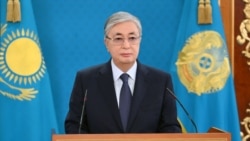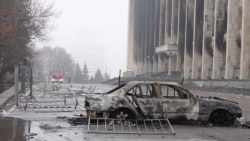Kazakhstan President Kassym-Jomart Tokayev issued a shoot-to-kill order Friday for security forces dealing with protesters following a week of unrest in the Central Asian country.
In a televised national address, the president said, "Terrorists continue to damage state and private property and use weapons against civilians. I have given the order to law enforcement to shoot to kill without warning."
In the address, Tokayev dismissed international calls for his government to negotiate with the protesters — which he continues to claim, without evidence, are trained and organized by unnamed foreign entities.
“What nonsense,” he said. “What kind of negotiations can there be with criminals, with murderers?”
He called the protesters bandits and terrorists who must be destroyed, and he promised this would be done shortly. He also thanked Russian President Vladimir Putin for promptly sending troops, at Tokayev’s request, to help crack down on the protests.
Protests broke out in Kazakhstan late last week over fuel prices and escalated into widespread violence.
Leaders outside the region reacted Friday to the developments in the country.
U.S. Secretary of State Antony Blinken said the United States was "very concerned" about the state of emergency in Kazakhstan.
"We're watching the situation with real concern, and we are encouraging everyone to find a peaceful resolution," he said.
The State Department on Friday approved the “voluntary departure” of nonemergency U.S. government employees and their family members working at the U.S. consulate in Kazakhstan’s largest city, Almaty.
A State Department advisory also warned that the situation in Kazakhstan could affect the U.S. Embassy in Kazakhstan’s ability to provide assistance to U.S. citizens departing the Central Asian nation.
In Berlin, Foreign Ministry spokesperson Christofer Burger said Germany was still investigating the reports from Kazakhstan, but he questioned the use of lethal force against civilians and said the government bears responsibility for the protection of its citizens.
During a joint news conference in Paris with French President Emmanuel Macron, European Council President Ursula Von der Leyen called for the rights and security of the Kazakh citizens to be protected, and both leaders called for an end to the violence. France currently holds the rotating presidency of the European Union.
NATO Secretary-General Jens Stoltenberg also called Friday for an end to the violence in Kazakhstan.
Speaking after chairing a virtual NATO meeting in Brussels, Stoltenberg said alliance members were concerned about the situation in Kazakhstan and said the rights of peaceful protest and freedom of expression needed to be respected.
United Nations spokesperson Stephane Dujarric called for Kazakhstan to respect "human rights and international standards while reestablishing public order.”
Chinese President Xi Jinping praised Tokayev on Friday for having “decisively taken strong measures at critical moments and quickly calming down the situation,” and referred to the violence by protesters as a “large-scale riot.”
China has invested heavily in Kazakhstan, which is a crucial part of Beijing’s Belt and Road initiative project connecting China to Europe.
Feng Chongyi, an associate professor in China Studies at Sydney’s University of Technology, told VOA’s Mandarin service that China is “very worried about spillover effects” from the Kazakhstan violence, which could encourage citizens in a neighboring country to Kazakhstan, or even Chinese citizens to rise up against their government.
He also noted that while China and Russia often work together on the international stage against the United States, they also have their own conflicts with each other, which he said could flare up over the violence in Kazakhstan. He said if Kazakhstan moves closer to Russia as a result of the current situation this would pose a threat to China’s interests.
Thursday, as news spread of Russian-led troops helping to quell the unrest, U.S. State Department spokesperson Ned Price told reporters, "The United States and, frankly, the world will be watching for any violation of human rights."
Reports from Kazakhstan’s main city, Almaty, said that while sporadic gunfire could be heard early Friday, the unrest appeared have paused, with similar reports from other cities.
The demonstrations began late last week in the western part of the country in protest against doubling fuel prices. But because they grew and spread so quickly, some political observers suggested they reflected wider discontent in the country, where residents have lived under authoritarianism since the nation gained independence from the Soviet Union in 1991.
On Friday, Kazakhstan’s Interior Ministry reported that security forces killed 26 protesters during the unrest and said 18 law enforcement officers were killed. It said more than 3,800 people had been detained. The numbers could not be independently verified.
Some information for this report came from The Associated Press, Reuters and Agence France-Presse. VOA’s Mandarin Service and Fern Robinson contributed to this report.







